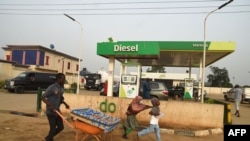Weeks of scarce fuel coupled with a failing national electricity grid are hurting countless small businesses across Nigeria. Some businesses have temporarily shut down, while others reduced hours to cope with the energy shortage.
In January, Toochukwu Ohatu started a tailoring business to supplement her laundry business and make some extra cash.
But barely three weeks after she set up, the business was almost grounded by the electricity issues affecting millions of Nigerians. Without power, there’s no way to run a sewing machine.
"It's just impossible to work and then as a new mom, everything,” she said. "I mean starting my tailoring business in January was a major leap for me and then we're struck with the fuel scarcity, no power supply."
The electricity supply was interrupted some two weeks ago when the national power grid malfunctioned due to glitches in the operating system.
Ohatu said she barely has one hour of electricity a day and it's affecting her productivity and income.
Authorities blame the fuel scarcity on the recall in January of about 170 million liters of tainted fuel imported from Europe. In February, the government announced it has released one billion liters of fuel from the national reserve to normalize distribution.
But amid a worldwide rise in oil and gas prices, the situation has dragged on and is affecting the overall economy. This week, Nigeria's Statistics Bureau said the country’s annual inflation rate has increased to 15.7 percent.
"It's been a tussle, it's almost becoming a new normal," said Abuja resident and driver Mohammed Enesi. “Because we're so resilient, we feel we can adapt."
Nigeria is Africa's biggest oil producer but struggles to meet its energy needs.
Only about 47 percent of Nigerians have access to electricity when it is available, according to World Bank estimates. Nigerian authorities in 2020 signed an electricity deal with German counterparts to improve the supply.
But analysts say the energy shortage is impacting citizens negatively.
"Somehow we've not been able to get the dynamics right," said analyst Rotimi Olawale. "To be very fair and honest in the last couple of years we have not witnessed this fuel scarcity that we're seeing now. The initial explanation they gave to us I don't think it holds water anymore. It puts a lot of pressure on people."
This week, Nigeria's president, Muhammadu Buhari, promised citizens that the fuel and electricity issues will soon be over.
But until the situation improves, millions of people and businesses will continue to suffer.




